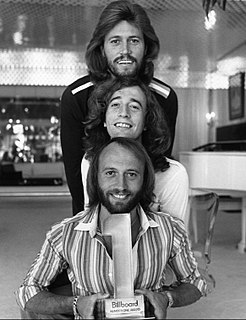
The Bee Gees were a pop music group formed in 1958. Their lineup consisted of brothers Barry, Robin, and Maurice Gibb. The trio were especially successful as a popular music act in the late 1960s and early 1970s, and later as prominent performers of the disco music era in the mid-to-late 1970s. The group sang recognisable three-part tight harmonies; Robin's clear vibrato lead vocals were a hallmark of their earlier hits, while Barry's R&B falsetto became their signature sound during the mid-to-late 1970s and 1980s. The Bee Gees wrote all of their own hits, as well as writing and producing several major hits for other artists.

Robin Hugh Gibb was an English singer, songwriter and record producer, who gained worldwide fame as a member of the pop group the Bee Gees. Their younger brother Andy was also a singer. Robin Gibb also had his own successful solo career.
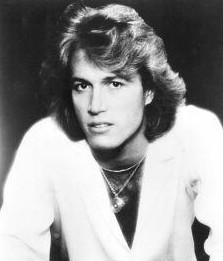
Andrew Roy Gibb was an English singer, songwriter, performer, and teen idol. He was the younger brother of the Bee Gees: Barry, Robin, and Maurice Gibb.
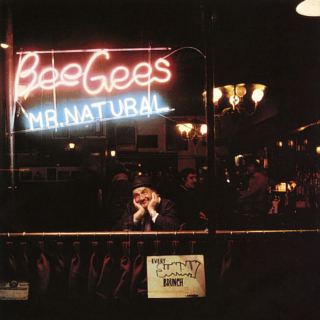
Mr. Natural is the Bee Gees' twelfth album, released in July 1974. It was the first Bee Gees release to be produced by Arif Mardin, who was partially responsible for launching the group's later major success with the follow-up album Main Course. The album's music incorporates more rhythm and blues, soul and funk and hard rock than their previous albums.

"Nights on Broadway" is a song by the Bee Gees from the Main Course album released in 1975. The second single released from the album, it immediately followed their number-one hit "Jive Talkin'". This track was credited to Barry, Robin and Maurice Gibb.
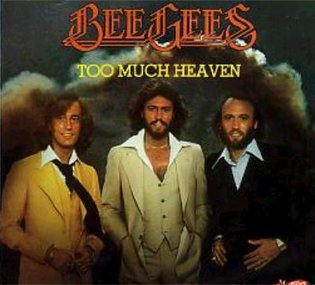
"Too Much Heaven" is a song by the Bee Gees, which was the band's contribution to the "Music for UNICEF" fund. They performed it at the Music for UNICEF Concert on 9 January 1979. The song later found its way to the group's thirteenth original album, Spirits Having Flown. It hit No. 1 in both the United States and Canada. In the United States, the song was the first single out of three from the album to interrupt a song's stay at #1. "Too Much Heaven" knocked "Le Freak" off the top spot for two weeks before returning to #1 again. It also rose to the top three in the United Kingdom. In the US, it would become the fourth of six consecutive No. 1s in a single year, equalling the record set by Bing Crosby, Elvis Presley, and the Beatles for the most consecutive No. 1 songs.
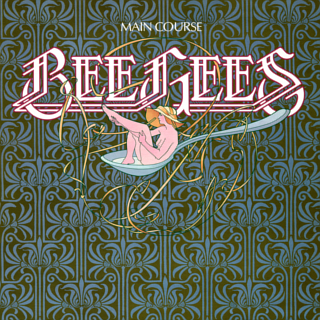
Main Course, released in 1975 for the RSO label, is the 13th album by the Bee Gees, and their last album to be released by Atlantic Records in the US under its distribution deal with Robert Stigwood. This album marked a change for the Bee Gees as it was their first album to include disco influenced songs, and it created the model for their output through the rest of the 1970s. It was the group's thirteenth album. Main Course was the first album to feature keyboardist Blue Weaver. The album cover with the band's new logo designed by US artist Drew Struzan made its first appearance here.

"You Should Be Dancing" is a song by the Bee Gees, from the album Children of the World, released in 1976. It hit No. 1 for one week on the American Billboard Hot 100, No. 1 for seven weeks on the US Hot Dance Club Play chart, and in September the same year, reached No. 5 on the UK Singles Chart. The song also peaked at No. 4 on the Billboard Soul chart. It was this song that first launched the Bee Gees into disco. It was also the only track from the group to top the dance chart.

Their Greatest Hits: The Record is the career retrospective greatest hits album by the Bee Gees, released on UTV Records and Polydor in November 2001 as HDCD. The album includes 40 tracks spanning over 35 years of music. Four of the songs were new recordings of classic Gibb compositions originally recorded by other artists, including "Emotion", "Heartbreaker", "Islands in the Stream", and "Immortality". It also features the Barry Gibb duet with Barbra Streisand, "Guilty", which originally appeared on Streisand's 1980 album of the same name. It is currently out of print and has been supplanted by another compilation, The Ultimate Bee Gees.

Living Eyes is the Bee Gees' sixteenth original album, released in 1981. The Bee Gees turned away from the disco sound that was prominent on their work in the middle-to-late 1970s with this album. However, the album was not a commercial success, perhaps due to their being so strongly associated with disco. It sold 750,000 copies worldwide, compared to 16 million copies of their previous studio album, Spirits Having Flown, in 1979. While it did not sell well in either the UK or the US, the album itself was a Top 40 hit in the majority of territories in which it saw wide release.
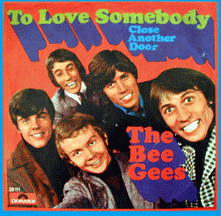
"To Love Somebody" is a song written by Barry and Robin Gibb. Produced by Robert Stigwood, it was the second single released by the Bee Gees from their international debut album, Bee Gees 1st, in 1967. The single reached No. 17 in the United States and No. 41 in the United Kingdom. The song's B-side was "Close Another Door". The single was reissued in 1980 on RSO Records with "How Can You Mend a Broken Heart" as its flipside. The song ranked at number 94 on NME magazine's "100 Best Tracks of the Sixties". It was a minor hit in the UK and France. It reached the top 20 in the US. It reached the top 10 in Canada.

After Dark is an album by Andy Gibb. It was his final studio album, and was released in 1980. It features his last US Top 10 single "Desire", "I Can't Help It" and two Bee Gees numbers "Rest Your Love on Me" and "Warm Ride".
"Love Me" is a song recorded by the Bee Gees, released on the 1976 album Children of the World. It was also included on the compilation album Love from the Bee Gees released only in the UK.

"Fanny " is a song written and performed by the Bee Gees for their Main Course album in 1975. It was the third single release from the album, peaking at number 12 on the United States Billboard Hot 100 chart and number two in Canada. According to Maurice Gibb, producer Quincy Jones called "Fanny" one of his favorite R&B songs of all time.

"Face to Face" is a ballad performed by Barry Gibb and Olivia Newton-John. It was released as a single from Gibb's 1984 album Now Voyager in Germany and Spain. It was also released in Brazil by Mercury Records. It was released as a single in the Philippines with "Temptation" as the B-side. It was also included on Newton-John's compilation Love Songs.

"Why" is a song written by Barry Gibb and composed by Andy Gibb, fourth and last single released on the album Shadow Dancing. Released as a single in September 1978 around the same time as "(Our Love) Don't Throw it All Away". It was his only single that was not charted in any countries.

The Heartbreaker Demos is a demo version of the album by Barry Gibb. Originally circulating on tape among collectors and later also on CD the album saw a legitimate and wide release on iTunes in October 2006. The album does not include the non-Gibb composition "Our Day Will Come".
The Guilty Demos is a demo version of the Barbra Streisand album Guilty by Barry Gibb. Not intended for release tapes of these had been circulating among fans before bootleg CDs started emerging. In October 2006 Gibb made these available through iTunes.



















